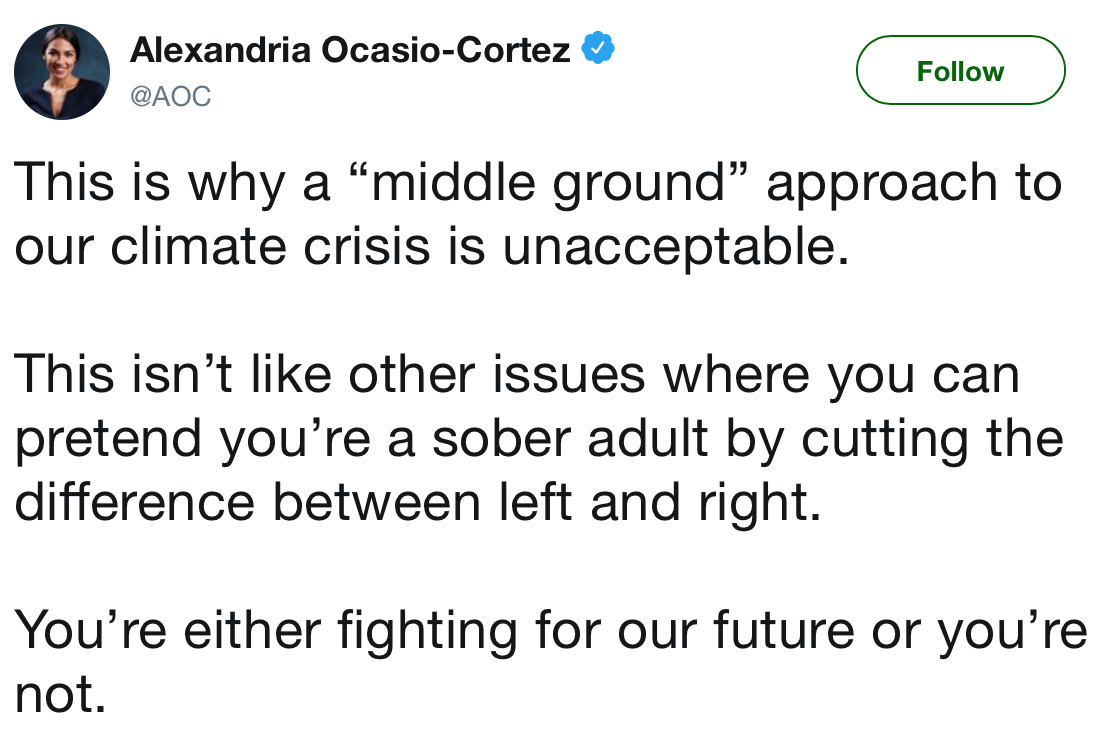Those who don't know history are doomed to repeat it. And I'm not talking about ancient history. I'm talking about 18 years ago.
Shortly after the life-altering events of 9/11, then-President George W. Bush went before America and the world to proclaim, "Every nation, in every region, now has a decision to make. Either you are with us, or you are with the terrorists." That type of absolutism may be "fine" for politics, but climate change is not political (at least it shouldn't be) -- it is scientific, and science is never so black and white.
Bernie Sanders and Alexandria Ocasio-Cortez just said that there is "no middle ground" on climate policy, which sounds reminiscent of Bush-43. AOC took it even further:

Sorry, Ms. Ocasio-Cortez, but simplistic, catchy phrases may get attention and votes, but by making a naive and sweeping statement like this, you will automatically short-circuit any type of reasonable climate policy -- the middle ground. You cannot be "for" or "against" science; you can only use it wisely. Your statements lack wisdom.
Furthermore, if you are so concerned about the climate issue, it is more than a little strange that you fail to embrace a technology that would put the brakes on gas emissions: nuclear energy. There's your middle ground.
There Is a Middle Ground on Climate Policy
In the hyperpartisan debate over climate policy, there are two extreme positions. Climate skeptics propose doing nothing; climate hysterics propose dismantling our entire energy and transportation infrastructure while imposing punitive taxes and economic policies. Both are untenable because doing nothing in the face of a potential threat is deeply unwise, while banning airplanes and "farting cows" is impractical and idiotic.
Level-headed people can and must agree on a common middle ground. A cautious approach to the environment would recognize that putting additional greenhouse gases into the atmosphere will cause Earth's temperature to continue to rise, and that this may cause problems. (Of course, it may cause some benefits, as well, such as boosting agriculture in cooler regions.) Simultaneously, a cautious approach to the economy would recognize that implementing broad, sweeping societal changes in a top-down fashion is not only expensive but likely to be fraught with serious unintended consequences.
Therefore, the best approach to climate policy attempts to nudge the world toward carbon-free energy sources in the least economically painful way possible. As we have written previously, we believe there is a clear path forward that could gain wide support:
- Start building meltdown-proof Generation IV nuclear power plants right now.
- In the meantime, phase out coal while temporarily embracing natural gas.
- Upgrade our energy infrastructure with a smart grid, smart meters, better capacitors, and better transmission lines.
- Invest in solar and fusion power research.
- As our energy infrastructure improves, electric car technology will improve along with it, making fossil fuels largely obsolete.
This is a reasonable plan that will solve the problem of climate change. Unfortunately, there is a dearth of reasonable politicians to implement it.




